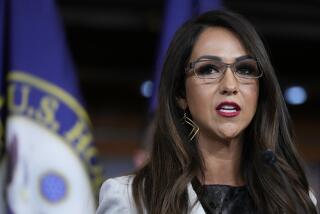Hillary Clinton Law Career Brings Up Spouse Role Issue
- Share via
CHICAGO — The Democratic presidential campaign dived Monday into the midst of an issue that has hovered on the edge of political debate for a decade: How should a politician’s work affect his or her spouse’s career?
On Sunday, former California Gov. Edmund G. (Jerry) Brown Jr. accused Arkansas Gov. Bill Clinton of having improperly “funneled money to his wife’s law firm.” Clinton angrily denied the charge and said Brown was “not worth being on the same platform with my wife.”
On Monday, Hillary Clinton herself went on the offensive. “I suppose I could have stayed home and baked cookies and had teas, but what I decided to do is fulfill my profession,” she told reporters here Monday morning, setting off a new round of jitters among campaign aides fearful of offending women who are full-time homemakers.
Insisting she had “done everything I know how” to avoid any conflict between her law practice and her husband’s political career, Hillary Clinton tried to shift the focus of the debate away from Brown’s question of conflict of interest.
The real issue, she said, is “women making the choices that are right for them.”
“This is uncharted terrain,” she added in an interview, “there is no road map.”
“How to avoid the appearance of conflict while still allowing the spouse to pursue the work of their lives is going to be the issue” for the entire group of politicians now coming to national prominence, she said. “It’s a generational change,” one that “is still difficult for people to understand right now.”
On Sunday, Brown, citing a report he had heard from Ralph Nader about a Washington Post article on the Clintons, accused Clinton of enriching his wife’s firm, the Rose Law Firm. The Post made no such direct accusation; instead, it described the influence the firm wields and noted that Clinton critics have alleged a conflict of interest. It said that most people “who want something out of the state” will often solicit support from both the governor and his wife’s law firm.
Until recently, the question of whether a spouse’s work conflicted with or influenced the other partner in the marriage seldom arose. Politicians--almost all of them male--had spouses like Barbara Bush, women who stayed home, reared the children and appeared in public only in the role of the supportive and dependent mate.
But recently, the list of women or men whose employment has caused some embarrassment for their political spouses has grown long. In some cases, it was because of actual conflicts of interest, in others, because the situation looked bad.
In Illinois, for example, Jayne Carr Thompson opted to put her legal career on ice when her husband, James R. Thompson, was first elected governor in 1976.
Marilyn Quayle, wife of Vice President Dan Quayle, explored joining a law firm in 1988 after her husband was elected to national office but decided to abandon the idea.
Marion Javits, wife of the late senator from New York, Jacob Javits, was one of the first spouses to encounter this problem. In 1976, she was criticized for taking a $67,500 public relations job with Iran National Airlines while her husband served on the Foreign Relations Committee. Critics said her employers gave her the job in an effort to influence her husband.
“Not a chance,” she said. “I’ve earned what I’ve gone after.” She quit the firm handling the airline account but continued with her career, and her husband weathered the storm.
Others whose employment has raised political problems for their spouses include Betty Wright, wife of former House Speaker Jim Wright (D-Tex.); John A. Zacarro, husband of former Rep. Geraldine A. Ferraro (D-N.Y.), and Richard Blum, husband of former San Francisco Mayor Dianne Feinstein.
Stanley Brand, a Washington, D.C., lawyer who specializes in political ethics, said that political spouses have become much more conscious of the potential conflict of interest since Jim Wright resigned in 1989. That incident stemmed, in part, from his wife’s employment by a Texas businessman who sought favors from the Speaker.
“It’s an irony of the liberated age that the more independent you are, the more you have to prove it,” Brand said.
Ruth Harkin, whose husband, Iowa Sen. Tom Harkin, recently dropped out of the Democratic presidential race, said she believes the political problems of the issue have begun to fade. Two years ago, she said, she expected that her work with a Washington law firm, where she is a lobbyist, would become an issue in her husband’s campaign for reelection. But his opponent, Tom Tauke, never raised the issue.
“To do it now,” she said, “almost seems sexist.”
At least some Clinton advisers believe Brown may lose support among women because of the appearance of attacking Hillary Clinton’s work.
Brown moved Monday to try to avoid that perception, insisting at a campaign stop that his quarrel was with Bill Clinton only, not with his wife. “We’re not talking about his wife,” he said. “She can do whatever she wants. . . . We’re talking about a man who is running for President, and it’s up to him to purge his Administration of conflict of interest and cronyism.”
But the facts of Clinton’s case indicate that the issue is far more complicated than Brown’s remarks might suggest.
According to the Clintons, Hillary Clinton has avoided doing business with the state throughout her husband’s career. So far, that assertion has been challenged in only one case--Hillary Clinton’s possible representation before a state agency of a real estate partnership in which the couple had invested. The extent of her involvement in that case remains unclear.
Staff writer Bob Secter in Chicago contributed to this story.
More to Read
Get the L.A. Times Politics newsletter
Deeply reported insights into legislation, politics and policy from Sacramento, Washington and beyond. In your inbox twice per week.
You may occasionally receive promotional content from the Los Angeles Times.











